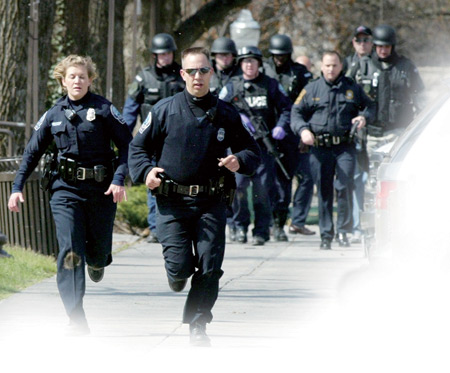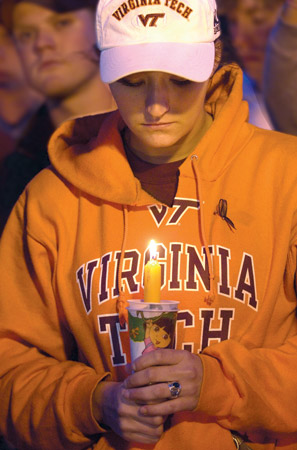|
|
|
中英互译:直面美国暴力(组图)http://www.sina.com.cn
2007年05月14日 10:39 英语周报大学版
 直面美国暴力
Facing up to violence in America 直面美国暴力 (2006-2007学年第34期) By Jonathan Zimmerman 郑睿 译 [1]“Turn on your TV,” a friend instructed via e-mail. “Right now.” So I did. And then I saw the murder and mayhem at Virginia Tech, where more than 30 people were gunned down Monday morning. I watched police officers storming buildings, rifles ready. Medics carried away the wounded and the dead. Dazed students embraced each other or looked blankly at the scrum of cameras, wearing empty stares of shock. [2]But I wasn’t shocked. Upset, yes — but not shocked. And that should shock all of us.We have been here before, of course. The sites of prior school massacres are etched on our minds, a symbolic shorthand for the violence and malevolence that none of us can comprehend. Paducah, Ky. Springfield, Ore. And, most of all, Columbine High School in Littleton, Colo. [3]So it’s hard to be shocked when you see it all again, unfolding in real time on television and the Internet. And it’s hard to avoid the same facile questions — and the same superficial answers — that followed the other tragedies. [4]Whenever something like this happens, of course, everyone wants to know why. So they seize upon the particulars of the case, probing the killers’ backgrounds and psyches: this one was bullied, that one used drugs, and so on. Or they make enormous generalizations about American culture, to suggest that we’re all going to hell in a handbasket. [5]In the wake of Columbine, for example, prominent conservative Tom DeLay linked youth violence with the teaching of evolution in schools and “working mothers who take birth control pills.” No less absurdly, some commentators tried to make violent video games the culprit, as if playing a few rounds of Grand Theft Auto makes you shoot up a school. [6]It’s hard to know why a specific killer acted in the way he did. Rather than focusing narrowly upon this awful event, then, we should declare a National Day of Mourning and Reflection on Violence in America. Besides memorializing the dead, at Virginia Tech and elsewhere, this annual federal holiday would also seek to spark a national conversation about Americans as a people: who we are, and who we would like to become. [7]Why, we should ask, are the gunmen in school massacres almost always male? What does that tell us about the ways we socialize boys in America? About relations between the sexes? About the relationship between violence and manhood? [8]Second, why are most of these gunmen also white? (Yes, reports indicate the Virginia Tech gunman was Asian; but almost every other mass shooter has been white.) Black and Latino boys commit plenty of violence in school, of course, but they’re more likely to assault an individual whom they know. White shooters more often kill en masse and randomly: They’re aiming for high body counts, not for a particular target. Why? [9]Third, why do so many American men — and, increasingly, many American women — own guns? Between 40 percent and 50 percent of American households own a gun, one of the highest percentages in the Western world. We can and should debate the best ways to regulate guns, but we simply cannot deny their prevalence in our society. And even though Virginia Tech was nominally a “gun-free zone,” the shooter had no trouble bringing weapons there. Why do so many Americans own guns? Which Americans choose to purchase them? And how do guns influence the nature of violence in America? [10]Fourth, what messages do our various mass media transmit about men, women, and violence? In the recent imbroglio- over racist comments by Don Imus, many commentators observed-correctly-that similarly bigoted- language suffuses America’s mainstream media. But US airwaves are saturated with violence, too, ranging from shoot’em-up movies to rape and torture. And most of this on-screen violence is committed by men, as well. I’m not saying that the mass media cause violent behavior, because we can’t be sure of that. But these images do make violence more “normal” and acceptable in US society. And that can’t be a good thing. [11]Last, and most important, what can we do to change? How, as a nation, can we become less violent? Is it even possible? I’d like to say it is, because I believe deeply in our nation’s potential for renewal and transformation. But in darker moments, I’m not so sure. [12]And, surely, the Virginia Tech massacre is one of the darkest moments of all. That’s precisely why we need to shed light, right now, upon the larger patterns of violence that surround us. We must transcend the particulars of this awful event so that we can see it in its wider national context. And we must not look away. [13]So I propose this Thursday, April 19, as National Day of Mourning and Reflection on Violence in America. That day marks the 12th anniversary of the bombing of the Alfred P. Murrah Building in Oklahoma City, where 168 innocents lost their lives to a homegrown American fanatic. As I said, we’ve been here before. And none of us should rest until we’re all shocked by it. 中英互译:直面美国暴力(组图) 参考译文: [1]“快打开电视,”朋友通过电子邮件让我这么做。“就是现在。”我就按照他所说的打开了电视。随后我就看到了弗吉尼亚理工大学校园枪击案引起的混乱场面。周一早晨有30多人被枪杀。我看到电视里警察正在包围大楼,持枪待命。医疗队运走伤员与死者。茫然的学生们相拥着,或者毫无表情地看着一大堆摄影机镜头,惊恐的眼神显得木然无助。 [2]我并不感到震惊。但我感到不安,而不是震惊。这会使我们所有人感到震惊。当然我们以前也经历过这种震惊。先前的校园大屠杀场景还历历在目,快速闪现的是这种我们不可理解的暴力与恶意的一幕幕镜头。肯塔基州的帕迪尤卡,俄勒冈州的斯普林菲尔德,特别是科罗拉多州利特尔顿镇上的科伦拜恩高中枪击事件。 [3]因此,当你在实时电视报道及互联网上再次看到这一切的时候就很难被震动了。紧随着其他悲剧的发生,也很难避免这些容易想到的问题以及同样肤浅的回答。 [4]无论此类事件在何时发生,每个人自然会想知道为什么。因此他们抓住案件细节,探查杀人犯的背景资料与精神状况:这个人曾受到欺凌,那个人是吸毒者,还有其他各种情况。或者他们对美国文化做了不计其数的总结,并认为情况将迅速恶化。 [5] 比如,紧随科伦拜恩高中枪击事件,著名的保守派人士汤姆·迪莱把青春期暴力与学校教学方式的演变及 “服用节育药片的外出工作的母亲们”的现象联系起来。同样荒谬的是,某些评论家试图将暴力电脑游戏归结为暴力事件发生的罪魁祸首,好像玩几个回合的“侠盗猎车手”电脑游戏就会导致你枪击校园。 [6]很难知道某个杀人犯为什么会这样做。我们不要仅仅聚焦在这个可怕的事件上,我们应当宣布在美国设立一个暴力事件悼念与反思日。在这个每年举行的联邦节日里,除了悼念弗吉尼亚理工大学以及其它地方枪击案的遇难者,还应当引发一场全美民族的大讨论:我们是谁以及我们会变成怎样的人。 [7]我们应当扪心自问,为什么在校园枪击案中,持枪歹徒几乎都是男性?关于我们以什么方式使男孩适应美国社会生活,这告诉了我们什么呢?这告诉了我们两性之间的关系是怎样的呢?这告诉了我们暴力与男儿气概之间存在何种关系? [8]其次,为什么绝大多数持枪歹徒都是白人?(的确,报告显示,弗吉尼亚理工大学的枪击犯是亚洲人,但是绝大多数其他特大枪击案犯都是白人。)当然,黑人及拉丁美洲男孩在校园也犯下许多暴行,但他们则更可能去袭击他们所认识的人。白人枪击犯的枪击对象多为人群并随意射击:他们的目标在于高射杀人数,而并没有一个明确的目标。这是为什么呢? [9]第三,为什么有那么多美国男性,还有越来越多的美国女性拥有枪械呢?40%至50%的美国家庭都拥有一支枪,该比例居西方国家前列。我们可以并应当对枪械管制的最佳方法进行讨论,但我们自然也不能否认我们社会盛行持枪的现状。弗吉尼亚理工大学在名义上甚至还是一个“禁止枪械进入的区域”,持枪歹徒还是能畅行无阻地把枪械带入。为什么有那么多的美国人拥有枪械呢?哪类美国人会选择购买枪械呢?枪械又是如何影响美国暴力的性质的呢? [10]第四,关于对男人、女人以及暴力,我们的各类大众传媒传递了怎样的信息呢?最近唐·伊穆斯对于种族主义的评论引发了纠纷。对此,许多评论家的观察是正确的,即类似的偏执语言充斥着美国的主流媒体。但是美国的电视广播也同样充满暴力,从枪击片到强奸与虐待。并且绝大部分荧屏上的暴力也是由男性实施的。我并不是说大众传媒导致了暴力行为,因为我们对此还不能确定。但是这些影像确实使暴力在美国社会变得更为“常见”与可接受。那可不是件好事情。 [11]最后,也是最重要的一点,我们能做些什么来改变这种现状?作为一个国家,我们如何才能变得不那么暴力?这还有可能实现吗?我想说这是有可能的,因为我对我们国家的复兴与改革所表现出的潜质深信不疑。但要是在较为黑暗的时刻,我就没那么肯定了。 [12]可以肯定的是,弗吉尼亚理工大学枪击案是最为黑暗的一个时刻。那恰恰是我们为什么要立刻搞清楚围绕在我们周边的较大规模暴力的格局。我们必须超越这一特定的可怕事件本身,这样我们才能够从更为宽广的全国的视野来看待这一事件。对此我们绝不能袖手旁观。 [13]因此,我提议本周四,也就是4月19日,作为美国暴力事件悼念与反思日。这天也是美国俄克拉何马市艾尔弗雷德·P·默里联邦大楼爆炸案的12周年纪念日。那次爆炸案使168名无辜者丧生于一个美国本土长大的狂热分子手下。正如我所说的,我们以前也曾经历过这些,我们也无人可停脚休息,直至我们对这类暴力事件感到震惊。
【发表评论】
|
||||||||||

